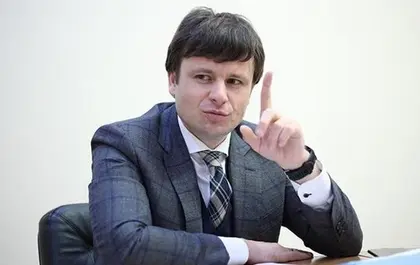Serhiy Marchenko, who formerly served as deputy finance minister and deputy head of presidential administration, will be appointed finance minister at an emergency meeting of the Verkhovna Rada on March 30, according to several sources among the lawmakers of President Volodymyr Zelensky’s 248-member Servant of the People parliament faction. They spoke on condition of anonymity because they were not authorized to speak to the press about the matter.
Marchenko didn’t reply to the Kyiv Post’s request to comment.
Marchenko will replace Ihor Umansky, who spent less than a month in the office. Umansky also did not respond to a request for comment.
Umansky was appointed on March 4 when Denys Shmygal replaced Oleksiy Honcharuk as prime minister. Umansky’s appointment was controversial for many reasons, including his unclear position on Ukraine’s cooperation with the International Monetary Fund. He also had a tainted reputation dating back to his work in President Viktor Yushchenko’s administration in 2008-2009, reportedly helping to kill cooperation with the IMF back then over his support of a state budget with high deficits. He and ex-Finance Minister Natalie Jaresko, who brought greater transparency to state spending, also parted ways during her tenure from 2014-2016.
Like Umansky, Marchenko is a career official. He has been in public service since 2002. He held a variety of positions, most notably deputy finance minister in 2016-2018 under then-Finance Minister Oleksandr Danylyuk, and deputy head of President Petro Poroshenko’s administration in 2018-2019. He ran for parliament in July 2019 on the ballot of ex-Prime Minister Volodymyr Groysman’s party Ukraine’s Strategy. The party won only 2.4% of the vote and didn’t make it to the parliament. He is seen as very knowledgeable about the state budget.
Danylyuk was positive about Marchenko’s candidacy.
“He is best suited for this challenging job now,” Danylyuk told the Kyiv Post.
It will be up to the parliament to vote for Marchenko at their emergency session on March 30. Organizing the emergency session has been a challenge since several lawmakers tested positive for COVID-19.
The position of the finance minister is especially essential as Ukraine prepares to meet the conditions for a new loan agreement with the International Monetary Fund in the nearest future, one that may reach $8 billion Initially the IMF was expected to loan $5.5 billion to Ukraine, but the sum is expected to go up now that Ukraine, like many other nations, is struggling with the spread of the COVID-19 virus.
The IMF has allocated emergency lending of $50 billion globally to help with the pandemic but has noted it can assemble $1 trillion in assets if necessary.
The IMF deal has been delayed as parliament dragged its feet on passing two key bills that the IMF demanded: introduction of the farmland market and a ban to return banks to former owners after nationalization – a measure that was supposed to stop billionaire oligarch Ihor Kolomoisky from getting back PrivatBank, which was nationalized in 2016 after an investigation found that $5.5 billion was stolen from it.
The parliament is expected to try to pass the bank bill during the emergency session on March 30.
Lawmaker Iryna Gerashchenko of the 27-member European Solidarity faction said on March 29 that Umansky filed his resignation as finance minister.
According to Gerashchenko, another minister filed his resignation: Ilya Yemets, the minister of health. Several Ukrainian media also reported, citing their sources, that Yemets was about to be replaced.
Yemets, a 64-year-old surgeon, came under fire for several insensitive remarks about the COVID-19 pandemic. In a TV interview, he said that the government shouldn’t be spending money on trying to save people over 65. Another time, he said that the virus will “kill all the retirees.”
Like Umansky, Yemets also spent less than one month in the Cabinet. It is his second time as the health minister: He held the position for six months in the Cabinet of Mykola Azarov in 2010-2011, when he was said to have been ousted because of his ineffectiveness as an administrator.
Kyiv Post chief editor Brian Bonner contributed to this story.
You can also highlight the text and press Ctrl + Enter







Comments (0)